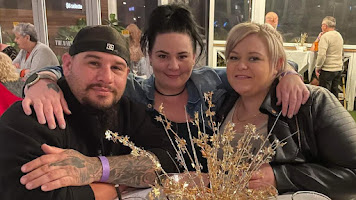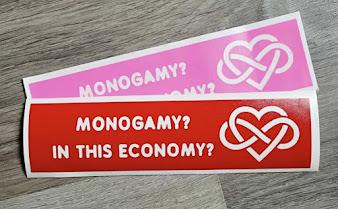TLC to launch "Seeking Brother Husband" TV series on MFM triads. Lots more polyamory in the news
From #SisterWives → to #SeekingBrotherHusband! Your new obsession premieres this March. pic.twitter.com/00sJJNtAcP
— TLC Network (@TLC) January 9, 2023

Following in the path of Sister Wives, TLC is diving deeper into the reality of plural marriage.Seeking Brother Husband, an all-new original series that follows four polyandrous couples [sic] as they navigate their relationships, is coming to TLC in March — and the trailer promises a tear-filled, awkward and exciting season that will track the changes each relationship undergoes.Among the four couples featured, each is at a different stage in their polyandry journey. One woman — who describes [her] polyandry as "the practice of one woman having multiple husbands, but those husbands cannot have any other partners" — has just married her second husband and is navigating the tumultuous transition, both for herself and for both her partners. "To do this lifestyle successfully, you have to be willing to go outside of your own comfort zones," she says.Another wife whose journey viewers will follow has embarked on the search for a third husband. ...The new show will also feature a couple who is just beginning to explore polyandry. The wife says that while many people assume that having "multiple male partners" is "just about sex," that's "definitely not" what it's about for her. She also calls out the "double standard" women face when it comes to polyandry, whether it's being labeled a "slut" for having multiple partners or being described as someone who "sleeps around."... The new couple also have their families to answer to. ...The final couple is already established as a polyandrous relationship, as Kim's first husband tells her second: "You were the first man I let my partner, Kim, be with." But in a confessional interview, he reveals the down side of the arrangement: "I was watching my partner fall for another man, right before my eyes."...
Angie Ebba, 42, of Portland, OR, has two local girlfriends, one long-distance partner, and a platonic life partner.Ebba is polyamorous, having multiple intimate romantic relationships at the same time. Her partners know about each other and have consented to the arrangement, she says.Polyamory is becoming more common in the United States. In 2021, one in nine Americans said they’d been in polyamorous relationships, and one in six said they wanted to try it, according to a study by researchers at the Kinsey Institute.While a high level of transparency is required to make polyamory work, those who practice it don’t always feel comfortable sharing their relationship status with health care professionals. ......Says Ian Kerner, PhD, a psychotherapist and sex therapist in New York City. “As polyamorous systems are still on the outskirts of the mainstream, some doctors may have implicit biases or explicit judgments, especially if they are lacking in experience.”People who practice polyamory face unique health issues. These include a potentially higher risk of sexually transmitted infections (STIs) from having multiple sexual partners, and anxiety or depression stemming from managing multiple relationships.“It is of particular importance in OB/GYN given the risk of STI transmission, and its consequences such as infertility, vaginal discharge, and systemic illness,” says Cheruba Prabakar, MD, the CEO of Lamorinda Gynecology and Surgery in Lafayette, CA. “Disclosing information will allow the provider to think about the patient more holistically.”Ebba does not tell her doctors about her personal life. She knows other people in these relationships who have felt judged in clinical encounters, and she avoids disclosure unless absolutely necessary.“Primarily, I don't let my providers know because I've already in the past faced discrimination and awkwardness for being queer; I don't want that for being poly as well,” she says. “If I can avoid it, I will.”A study from 2019 of 20 people in consensual non-monogamous relationships – which can include polyamory – found most of them reported challenges in addressing their health care needs related to lack of provider knowledge, not enough preventive screenings, and stigmas that impacted their health and trust in the medical system.“Polyamorous people often have trouble seeking out health care because they fear being judged by their doctor or other clinicians who don't understand or respect their lifestyle choices,” says Akos Antwi, a psychiatric mental health nurse practitioner and co-owner of Revive Therapeutic Services in Rhode Island and Massachusetts. “They may also be reluctant to share information about their relationships with providers who aren't familiar with the complexities of polyamory.”Sharon Flicker, PhD, a clinical psychologist and assistant professor of psychology at California State University-Sacramento, says ... health care professionals can seek training to reduce their biases, and to better understand and address the unique needs of people involved in consensually non-monogamous relationships. In addition, offering to answer any questions that a doctor might have after disclosure can open the door to dialogue, according to Prabakar.People in polyamorous relationships also can look for affirming language on the websites of health providers, which may mention welcoming patients of all sexual orientations or gender identities. A first appointment can serve as an interview to find out what kind of terms a provider uses when referring to non-monogamy.Safely Navigating Sexy Time With Multiple PartnersPrabakar says sexual health and safety is at the forefront for her patients in polyamorous relationships because they are engaging with multiple partners.She recommends anyone who has multiple partners use condoms and dental dams for the prevention of STIs, like herpes and gonorrhea, in addition to receiving regular screening tests for the diseases.Tikva Wolf, from Asheville, NC, says she’s been in polyamorous relationships for 20 years. She says she has strict boundaries for engaging in new romantic relationships to protect her sexual health: She has sex only with people who know their current STI status, are clear communicators, and use protection.“If the conversation feels awkward, or they don't seem to know what they've been tested for, I don't engage in sex with them,” she says. “I don't start romantic partnerships with people unless they're on the same page about relationships, and I don't have casual sex.”Wolf says her actions toward transparency mirror the greater community of people who engage in polyamorous relationships.“Monogamy is the default setting, so there's a tendency to be more transparent about specific preferences upfront in any relationship that doesn't quite fit into that standard box,” she says.Some research backs up Wolf’s hypothesis. A 2015 study in The Journal of Sexual Medicine found that polyamorous people reported more lifetime sexual partners than people in monogamous relationships, but were more likely to report using condoms and be tested for STIs. About one-quarter of monogamous partners reported having sex outside of their primary relationship but not informing their primary partner. ...Taking Care of Mental HealthNot only does a polyamorous lifestyle require talking about sexual health and romantic boundaries, it demands an openness with feelings as they come up. ...
Searching for rights in a monogamous worldJan 12th 2023 | Somerville, MassachusettsIt all began with Dungeons & Dragons. In a club for enthusiasts of the fantasy role-play game, Nate met Ashley and Erik, a married couple. Two years of friendship turned to romance and intimacy: first between Ashley and Nate, then him and Erik. They formed a triad. There was frank talk about commitment, finances and parenting—Ashley and Erik have two children, who now call Nate “bonus daddy”. “There’s a lot of love going on,” he says, as the three adults cosy up on their couch....In October they held a commitment ceremony resembling a wedding [pictured above], albeit with more vows. (“We tried to keep them short,” says Ashley.) The arrangement has no legal weight.... So they signed a “no-nup”: a contract outlining alimony and child-care responsibilities in the event of a break-up or death among partners who were never legally married. Their lawyer, Diana Adams, notarised it with a “lovely stamp that goes ker-chunk”....Triads and quads are what Laura Boyle, a relationship coach, calls “poster-child polyamory”: comprehensible to monogamous people who can grasp the concept of a closed unit living together. In fact networks are often more complicated, represented by V- and N-shaped configurations that don’t imply mutual attraction among several people. Ms Boyle lives separately from her three partners; she co-parents with her ex and his wife. She calls polyamorous people “folks with a scheduling kink” and thinks they are more willing to accept some fluidity in their relationships, for which marriage is a poor framework.Still, marriage confers tax, health-care and immigration benefits that polyamorous people would like to claim too. States and cities are granting slivers of legal recognition. In September a judge in New York City allowed the third partner of a deceased man to argue that he should inherit their rent-stabilised lease. A dozen states allow triple-parent custody of children.In 2020 Somerville, outside Boston, became the first city in the country to offer multi-partner domestic partnerships, followed by nearby Arlington and Cambridge. Municipal employers must provide health insurance and other benefits to employees’ partners. Private firms are under no such obligation—that requirement would have to come from the state. ...Polyamorous people report high levels of discrimination by employers and landlords; courts often treat them unfavourably in custody disputes. Advocates are pushing for ordinances banning discrimination on the basis of relationship status. Stigma indeed means many stay quiet. ......Views are changing: in 2020 a fifth of Americans told Gallup that polygamy was morally acceptable, up fourfold since 2006. ... Millennials are most inclined towards non-monogamy: two in five prefer it. ...
The nation’s highest court ruled in favor of three men who lived together for 10 years and the two who claimed survivor beneficiary rights when one died.

"Víctor Hugo Prada, Alejandro Rodríguez, and Manuel José Bermúdez
are one of the first triejas in Colombia." (Photo: Santiago Mesa)
By Catalina OquendoManuel Bermúdez is part of a polyamorous family of three men who sleep in a bed so wide it almost doesn’t fit in the bedroom. He has also been involved in a number of firsts for Colombia. He and his partner, Alejandro Rodríguez, became the first legally recognized same-sex marriage in 2000. In 2017, they added a third person to their union. In another first for Colombia, their tripartite matrimony was recently legally recognized by the nation’s highest court in a decision that affirms the pension beneficiary rights of the surviving spouses and revolutionizes the country’s laws....The story of this marriage of three begins in 1999 when the word polyamory was not fashionable. ... Manuel met Alejandro one night and they began a casual dating relationship. They soon fell in love, and a year later were married by a notary public in a symbolic wedding that did not confer any legal rights to the spouses. Despite the opposition of the Catholic Church and other notaries, they proclaimed their love in the glare of a harsh media spotlight.It was a symbolic and political act – a provocation intended to shake up the city [conservative Medellín] and ignite a battle for same-sex marriage that was just getting started in Colombia. Seven years later, when the Supreme Court extended de facto civil union rights to same-sex couples, Manuel and Alejandro married once again. This time, their union was legally recognized and had all the rights of any marriage.As happens to many couples, one of them met someone else. ... When he told Manuel about it, instead of separating, Alejandro and Manuel added Esnéider to the relationship. “I asked myself, ‘Why shouldn’t my husband have a boyfriend?’ It seems very unreasonable to separate abruptly when it takes so long to win each other over fall in love,” said Manuel. That was a crucial revelation for Manuel, who did not like Esnéider at first. But the two ended up falling deeply in love. “I don’t know how this will turn out,” he said at the time, “but let’s see what life is like for the three of us.”...They presented themselves as a family of three because that’s what they were. “The three of us do have sex, of course, but this family is based on love.For 10 years, the trio were in a stable relationship, with all the ups and downs that every family experiences. ... “You have to be smart about polyamory because it’s not about jumping into a relationship. It’s about falling in love with each other. Falling in love with one person – fine. But falling in love with two is complicated, and three is very difficult. Some people who have tried to join the family just haven’t been able to deal with this,”Eventually, they decided to add another partner. Victor Prada, a theater actor and psychoanalysis student, became “the fourth,” and says, “That’s how they introduced me. The first night I was in bed with three men, I was so emotional that I couldn’t sleep.” After a period of dating the trio, Prada joined the family and began living with them. He says he always dreamed about having a stable family and he found one there. ...A death in this untraditional family soon shook its foundations. ... A few months after Esnéider died, Manuel and Alejandro applied to receive survivor benefits from Esnéider’s pension. The private pension fund rejected their claim on the grounds that it did not recognize polyamorous unions....But since their relationship was public, Bermúdez and Rodríguez were able to prove to a judge that they fulfilled the five-year cohabitation requirement. Four years after Esnéider’s death, a local court in Medellín ruled in favor of the two ... and ordered the pension fund to begin disbursing funds to Bermúdez and Rodríguez with retroactive effect. It was a surprising ruling for an often conservative judiciary that said its decision was based on the importance of autonomy. “Several people, regardless of gender, can come together in the spirit of building a family. One person can love two others at the same time, and three can love each other as well,” wrote the magistrates....The pension fund filed an appeal, and the case went to Colombia’s Supreme Court. While the wheels of justice slowly turned, Alejandro, Manuel and Victor recorded another first – they became the first trio to become legally married in Colombia. The marriage certificate states, “… the constitution of a tripartite patrimonial regimen,” and used a new legal term – trieja – a “throuple.”...The Supreme Court’s ruling in favor of the three spouses determined that this polyamorous family should be protected and have their pension rights recognized. Justice Santander Rafael Brito says that the ruling recognizes that people can choose their own family paradigm. ...In a statement to the Supreme Court’s media relations department, the presiding magistrate in the case said, “The number of permanent partners is irrelevant. In this case there were three, but there can be more, all with the same proportional rights. ...The decision could make life easier for spouses in a polyamorous relationship. “This opens up new possibilities in marriages of three people and for polyamory. This magistrate will go down in history as someone who dared introduce a new word in the legal canon,” said Manuel. There is already talk around Medellín of another group of polyamorous people who want to get married. ...
Polyamory is not easy....Polyamory isn’t easy due to society refusing to accept polyamory as acceptable as monogamy. Living in a polyamorous way is natural and easy for me.... I embraced a polyamorous life back in 2014 and haven’t looked back....So as an old year is passing... how did things go? ... What did I learn?...1. Only date others who are polyamorous.[By which she means] polyamorous in practice.2. Set boundaries.Repeat after me: It is ok to say no! It is imperative to say no. ... It is perfectly acceptable to opt out or avoid any kind of dynamic you are not comfortable with.3. Find Your People....My first introduction to polyamory involved a large group of polyamorous families who exemplified open, honest living and breaking the social norms in a healthy, egalitarian way. What stuck out to me the most was the supportive environment they all created, with various relationship configurations and family systems. I hold out hope for a large polycule someday where we each support every person’s individual growth and evolution.4. Discretion, Not Secrecy.It has been a long, hard, painful road for me to learn that discretion and secrecy are not the same thing. ...5. Relationships Can Be Whatever They Want to Become.The beauty of polyamorous relationships is that not all relationships need to look or stay a certain way. Relationship transition is an accepted part of polyamory. ... Each relationship can become what it is meant to be. ... I have found freedom in accepting my relationships as they are.

Freepik
By Jasmine KazlauskasAn Australian “throuple” have opened up about how they became a polyamorous household – after one half of a couple fell in love with her best mate.Adelaide couple Dee, 30, and Dennis, 36, were in a monogamous relationship for seven years, and had two children together, now aged five and two.While she had not planned it, Dee ended up developing feelings towards her best friend of two years Amy, 31, which complicated things.After a deep discussion, the couple agreed that Dee could start dating Amy, alongside having a relationship with Dennis.But after two months, Amy – who has a five-year-old child of her own – and Dennis had began having feelings for each other, due to spending so much time together with Dee.The three of them then decided in April 2021 that it was time to become a “throuple”, a term used to define a romantic relationship between three people.The group now live together in one home with their three children, where the three adults share one king-sized bed and parent their kids equally. ...While Amy and Dennis are new to polyamorous relationships, Dee has previously been in one....Amy says all the kids are happy with the set up, and they all treat each other as siblings, while the three of them parent equally.“Our children are now siblings, and they have adjusted really well to the dynamic,” she said....The throuple say that their relationship is very healthy and balanced, and have hit back at the negative misconceptions about polyamory. ... “It’s not just a sex thing,” Amy said ...“One of the biggest misconceptions is that by loving a second person, you love the first person less. This is so untrue.“It isn’t for everyone, but it makes sense for us. We compliment each other in different ways. There are so many variables to the dynamic when it comes to interests. We all share different things with each other.“I get to date my two best friends. We are a unit, it is supportive and I love that.“We also get double the cuddles. Who doesn’t love that?”
“This struggle will define in what world our children and grandchildren will live, and then their children and grandchildren. It will define whether it will be a democracy for Ukrainians and for Americans.”

|
|
The Russian family-cartoon series Masyanya turned dissident. Watch. The cartoonist has fled. Update: a brilliant sequel of turnabout, with a coda of empathy in wartime. |
Here was a country with a tragic history that had at last begun to build, with great effort, a better society. What made Ukraine different from any other country I had ever seen—certainly from my own—was its spirit of constant self-improvement, which included frank self-criticism. For example, there’s no cult of Volodymyr Zelensky in Ukraine—a number of Ukrainians told me that he had made mistakes, that they’d vote against him after the war was won. Maxim Prykupenko, a hospital director in Lviv, called Ukraine “a free country aspiring to be better all the time.” The Russians, he added, “are destroying a beautiful country for no logical reason to do it. Maybe they are destroying us just because we have a better life.”

|
|
"Defenders of Bakhmut," where Zelensky met soldiers
at the front line who gave him the signed battle flag that he
presented to Nancy Pelosi. Art by Natasha Le in Mikolaiv, who reinterprets traditional
guardian angels as riot grrls for an upcoming
generation. |
SUBSCRIBE by a feed, or
SUBSCRIBE by email
_________________________
[Permalink]
Labels: #Polyamory, #PolyamoryNews, #PolyDating, #PolyLegal, #SeekingBrotherHusband, Australia/NZ, dating, India/South Asia, Latin America, legal, tabloids, TV














